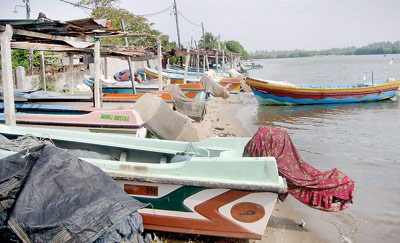News
Fisheries Ministry casts the net wide: No more Laila and Surukku

Protests in Kalpitiya (above) and Negombo (right)
The Fisheries Ministry has given a grace period till Sunday February 14, for fishermen to abandon the banned fishing gear and switch to environmental-friendly gear and warned tough action would be taken against those defying the ban.
The warning comes days after the government announced it would strictly impose the ban on the use of destructive fishing methods known as ‘Laila’ and ‘Surukku’.
This week fisher folk staged protests in Negombo and Kalpitiya against the ban, prompting Fisheries Minister Mahinda Amarweera meet fisher folk representatives.
Some protesters alleged that the ministry had been selective in imposing the ban and that it had issued licences for some people to use illegal fishing methods.
The minister, however, said the protests were largely because the fisher folk had been ill-informed and not properly explained as to why the ban was being imposed.
“These fishing gear now coming under the ban had been used since 1982 and the ministry had issued licences also,” the minister told a media conference on Friday.

Protest in Chilaw: Fishermen moor their boats on the shore. Pic by Augustin Fernando
The minister said the ban was imposed not arbitrarily but on the basis of recommendations from the National Aquatic Resources Research and Development Agency (NARA) which had carried out a thorough study on the use of environmentally dangerous fishing gear. NARA had recommended the immediate imposition of the ban to ensure “our sea bed is not turned into a desert.”
Following a European Union ban on Sri Lanka’s fish exports, Sri Lanka has given assurances to the European Union that it would crack down on all illegal fishing methods.
Minister Amarweera said that instead of harmful fishing gear such as Laila and Surukku, the ministry has introduced a modified net with bigger rings to prevent smaller fish from being caught.
The Surukku net with small rings is popular among fisher folk in Mannar, Mullaithivu and Negombo. They use this net equipped with light to catch fish in the night.
This fishing method targets shoal of small fish and it involves at least six divers diving to the depths of the sea to attend to the loops in the net.
The method also causes damage to the marine ecosystem. The divers not only destroy the marine resources such as corals, but they also deny food for big fish.
The new regulations have put an end to this practice. Those who violate the ban will be imposed fines upto Rs. 50,000.
The minister said that in addition some bigtime fishermen use dynamite to catch fish, affecting the marine resources and the livelihood of small scale fisher folks.
“I have instructed the Police, the Navy, the Coastguard and officials of the Fisheries Department to take stern action against those who are using the banned fishing gear and methods,” Minister Amarweera said.
NARA’s Marine Biological Resources Division Chief Dr. R.R.P. Maldeniya, who headed the study, told the Sunday Times that since there were several alternatives to the traditional purse seine net, the use of nets such as Laila and Surukku is destructive.
“That’s why we recommended to the ministry to take immediate action.”
Stressing that fisheries resources were not only for one generation, the senior researcher said a balance should be maintained when it comes to consuming the sea resources.
Last month, the Navy arrested 58 fishermen in Kalpitiya using Surukku nets. The arrested persons along with their gear were handed over to Puttalam’s Assistant Fisheries Director for legal action.
It is these arrests that prompted the fisher folk in Kalpitiya to take to the streets this week, bringing traffic along the main road to a standstill.
They claimed that they had got necessary permission from the Fisheries Department to use the nets which the ministry has banned.
Leanous Sebastian, one of the fishermen who took part in the protest, said he had been using “Hambili nets”, with has larger rings than the banned varieties and it was unfair for the Government to ban this net, which had got the ministry approval.
“We don’t break the laws. If the Government is going to ban all these methods used by us, then the country has to import fish,” he said.
Kalpitiya’s Assistant Fisheries Director A.A. Wickremasinghe said the Department had not banned the “Hambili nets” but some fishermen use their licences to surreptitiously use banned nets.
(Additional reporting Hiran Priyankara)

